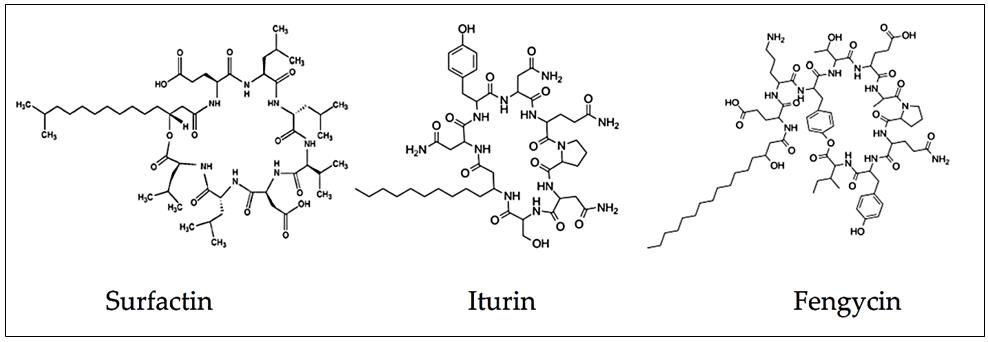Lifeasible focuses on the application of microorganisms in plant protection and provides research services on lipopeptide-producing microorganisms to help accelerate the application of lipopeptides in plant protection.
Microorganisms and their bioactive compounds are being used to promote plant growth and health. One such crucial bioactive substance is lipopeptide, which plays a vital role in the protection of plants. Lipopeptides have anti-fungal, anti-bacterial, anti-viral, and anti-insect properties, as well as plant immunomodulatory activity. This shows that lipopeptides have a broad application prospect in plant protection. Bacillus spp. are important lipopeptide-producing genera. They produce a variety of lipopeptides, including surfactin, iturin, and fengycin.
 Fig. 1 Chemical structures of three important cyclic lipopeptides.
Fig. 1 Chemical structures of three important cyclic lipopeptides.
The application of lipopeptides in plant protection (especially crop protection) is environmentally friendly and economical. Lifeasible focuses on plant protection applications of lipopeptide-producing microorganisms and provides services for lipopeptide-producing microorganisms.
Screening and identification of lipopeptide-producing strains
We provide services for the screening and identification of lipopeptide-producing microorganisms. We screen and isolate strains through various inhibition tests and isolation tests. The strains are then identified by morphological characterization, physiological and biochemical tests, and 16S rDNA sequencing. Subsequently, we perform the fermentation, extraction, purification, and identification of lipopeptides. If lipopeptide stability studies are required, we can also provide them.
Improving lipopeptide production and optimizing lipopeptides
Enhancing the production of lipopeptides and the effectiveness of lipopeptides in protecting plants can further promote the use of lipopeptides in plant protection. We provide services to help improve lipopeptide production of lipopeptide-producing microorganisms and optimize the anti-microbial capacity, anti-viral capacity, anti-insect capacity, and plant immunomodulatory capacity of lipopeptides.
Study on the mechanism of action of lipopeptides to protect plants
The study of microbial inhibition mechanism, anti-insect mechanism, and immunomodulatory mechanism of lipopeptides can help to develop lipopeptide analogs for plant protection. We provide services on various action mechanisms of lipopeptides and explore the direct and indirect plant protection mechanisms. We focus on research services on the mechanism of action of lipopeptides that stimulate plant defense responses.
Skilled experimental operators
We have skilled microbial culture and isolation staff and lipopeptide extraction and identification staff who have been working on lipopeptide-producing microorganisms for a long time and have rich operational experience, strain identification ability, and lipopeptide identification ability.
Gene editing-based optimization of lipopeptides
Not only do we optimize the production of lipopeptides by optimizing the fermentation conditions, but we also optimize the production of lipopeptides by gene editing. In addition, we also use gene editing to optimize the plant protection effects of lipopeptides.
In-depth understanding of plant immune mechanisms
We focus on plant protection and deeply understand the plant's protective mechanisms, which allows us to easily study the mechanism of lipopeptides in the stimulation of plant immunity.
Lifeasible aims to accelerate the application of lipopeptides in plant protection and provides one-stop research services for lipopeptide-producing microorganisms, including screening of lipopeptide-producing microorganisms, identification of lipopeptides, improving lipopeptide production, optimizing lipopeptides, and research on the mechanism of lipopeptide in plant protection. If you need lipopeptide-producing microorganisms, please contact us.
References